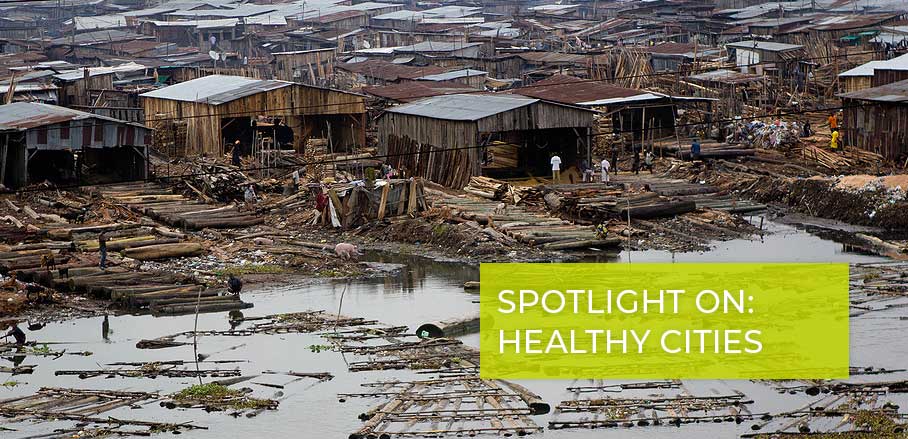Urban Slums in Nigeria: Ensuring Healthy Living Conditions
Many of Lagos’ residents live in informal settlements with no or limited access to basic services. With new immigrants arriving from rural areas every day, pressure increases on the already poor living conditions. Comprehensive action is needed to tackle interconnected social, environmental and health issues, says Olaoluwa Pheabian Akinwale.
The United Nations Human Settlements Programme (UNHS) defines a slum as a wide range of low-income settlements and/or poor human living conditions, which include the vast informal settlements that are quickly becoming the most visual expression of urban poverty. This is also the case in cities in Nigeria, where the growth rate of the urban population is faster than economic growth and increasingly out-paces the ability of the country’s health and social services to provide appropriate and necessary care.
Urbanisation is also changing the structures and functions of other social institutions. For example, urbanisation alters the role of the family, demographic structures, the nature of work, and the way people choose to live and with whom. It also modifies domestic roles and relations within the family, and redefines concepts of individual and social responsibility. The rising levels of poverty have been aggravated further by unemployment, underemployment, decrease in wages due to persistent inflation and uncontrolled rural-urban migration. The results are poverty and poor health outcomes, especially among the urban poor who live below the poverty line with limited access to social and health care services. For many people in such circumstances, slum living is an unavoidable reality.
Metropolitan Lagos and Challenges of Rural-urban Migration
Lagos State in south-western Nigeria has a population of about 20 million out of a national estimate of 180 million. Of this population, metropolitan Lagos, an area covering 37 per cent of the land area of Lagos State, is home to more than 85 per cent of the state population. Lagos metropolis represents the epitome of urban decay replete with environmental problems ranging from slums and squatter settlements to crime and delinquency.
The high population growth rate of Lagos has been largely attributed to rural-urban migration, which accounts for up to 80 per cent of the population increase. This growth rate, reaching up to 10 per cent over the last decade, has translated into an unprecedented demand for land. It is therefore a common phenomenon to see undeveloped land being taken over by the rural immigrants and leading to uncontrolled and unorganised developments of slum communities. These areas usually lack basic infrastructural facilities and are characterised by very poor environmental conditions.
Nearly two third of the Lagos metropolitan population occupies such informal settlements, squatter housing, unauthorised land developments, or rooms and flats in dilapidated and uncompleted buildings. The urban slum dwellers of Lagos are deprived of essential basic social facilities and are faced with poor living conditions due to population density, overcrowding, unemployment, poverty, lack of drinking water, inadequate liquid and solid waste management, noise pollution, poor health care access, poor structural quality of housing, cultural dislocation and insecure residential status.
These conditions make the informal settlements breeding grounds for diseases such as tuberculosis, hepatitis, dengue, pneumonia, malaria, cholera and diarrhoeal diseases. Besides, urban slum dwellers are at a high risk of non-communicable diseases such as asthma, heart disease, diabetes, mental health problems including anxiety, depression, insomnia and substance abuse as they adopt an urban lifestyle while lacking knowledge and information regarding health and health care.
Slum Upgrading Through a Comprehensive Approach
In order to make Lagos slums more inclusive, safe, resilient and sustainable so as to achieve the United Nations Sustainable Development Goal (SDG) 11, we need a comprehensive approach of slum upgrading. The upgrading process has to engage local governments in health development by ways of political commitment, institutional change, capacity building, partnership-based planning, innovative projects combined with infrastructure improvement, health promotion, and community participation.
Such slum upgrades for enhanced living conditions should consist of improving security of tenure through regularisation of land rights and improving the provision of basic services, such as access to clean water, energy for cooking and lighting, water drainage systems, security lighting, mitigation of environmental hazards, provisions of incentives for community management, improving access to health care and education, and enhancement of livelihoods through vocational training and microcredits.
New housing areas should be built with all the necessary facilities available from the onset including separate toilets constructed in each household to facilitate personal hygiene. This comprehensive approach should be carried out in a way that it considers the fears, needs and desires of the poor slum dwellers.
“Intervention Packages” for Improved Health of Urban Slum Dwellers
To address the health concerns of the urban slum dwellers in particular, the municipal governments should focus on multiple interventions so as to take care of the connectedness of their problems, and not simply carry out curative or preventive measures in one area of concern that would be limited in scope and probably less effective than a comprehensive approach. “Intervention packages” that address health service provision, environmental sanitation, personal hygiene, health care seeking behaviour, and livelihood opportunities at the same time will most likely have greater impact. We also recommend that all levels of government in Nigeria should develop strategies for sustainable development and infrastructure provision in order to transform the numerous slums in the country into sustainable communities.
- Urban Slums in Nigeria: Ensuring Healthy Living Conditions - 25. October 2018
